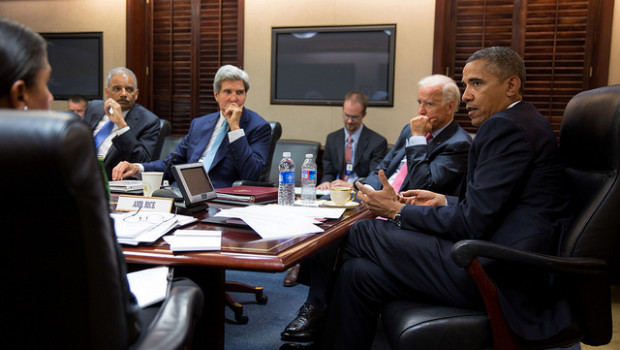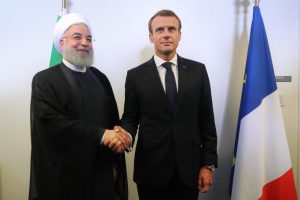by James A. Russell
Wow. This is what we were expecting from a guy that ran for president as a transformational figure but has left so many of us disappointed as he declined to dive into the scrum to get the ball.
But now? A deal where none thought one was possible. A deal in spite of his multiplying number of detractors on the home front and in Jerusalem. You have to give credit where credit is due.
If there is an abiding lesson from the Iran nuclear deal, it is that the US still holds the cards in seeking solutions to the world’s myriad problems. US political power and authority still matter – and we need a president and empowered, able deputies that can wield it. Hello Barack! Great job John. Welcome to the big leagues! Keep it going.
Isn’t this how its supposed to go for the world’s superpower? The United States orchestrated the P-5+1 unity with deft and subtle diplomacy every step of the way. French opposition was handled, the UK played its usual supporting role, the Russians actually chimed in, and the Israelis were politely but firmly kept at arm’s length. That’s what you call diplomacy. Do we think Jim Baker or Henry Kissinger would have done it any differently?
Perhaps most importantly, the deal hammered out in Geneva reflects things many thought had been lost in the Obama Administration – US global leadership, tough but sensible bargaining, compromise where necessary, and an agreement that ultimately makes the world a safer place in spite of detractors in Congress parroting lines supplied by the Israeli lobby.
We find out that the breakthrough with Iran was accompanied and perhaps enabled by a backchannel with Iran reminiscent of the Cold War era in which Kissinger was dispatched on various occasions to Brezhnev’s hunting dacha in the woods around Moscow. This time, William Burns and various others traveled on service elevators in hotels in Oman to meet with Iranian interlocutors earning their civil servant paychecks in their tireless search for peace in service of their country.
Another abiding lesson of the Iran deal is that smart, empowered cabinet secretaries can accomplish a lot if they are given a long leash and lots of gas to fly their airplane around the world. Hillary Clinton flew around a lot but accomplished little during her four years. John Kerry arrived, threw himself into difficult problems and is trying to move the ball forward and is apparently empowered by the White House. He won’t solve the all worlds problems — witness the Palestinians twisting in the wind — but at least he’s trying. Barack: keep on filling up his airplane with gas — the world still needs US leadership and maybe you need to take some of these trips with him.
One of the things missing from this White House from day one was the sense of teamwork and purpose that was supposed to have operationalized Obama’s transformational message during the campaign. In its place, we got a suspicious, insecure White House that distrusted and never really understood the vast governmental system that is was supposed to be in charge of. Many have watched in astonishment at the unused, broken inter-agency foreign policy process that has been pushed aside in favor of serendipitous, centralized decision-making by a few in the White House.
In this case, however, it seems clear that the White House relied on its team, delegated authority and reaped the rewards. Maybe there was a good reason that 59+ million Americans voted for John Kerry when he ran for president in 2004. Maybe the Obama Administration should start asking around in the State Department and the Defense Department what other good ideas are out there to address the world’s problems.
To be sure, the first phase of the agreement is the opening round in a series of negotiations that will prove difficult as Iran is forced to return its nuclear program to comprehensive safeguards administered by the International Atomic Energy Agency. The next round of negotiations will have their ups and downs — just as the arms control talks with the Soviets did all those many years ago.
Moreover, domestic political opponents of accommodation with Iran represent another obstacle to finally sealing the deal over the next six months. Fueled by opposition to anything Obama wants and the Israeli lobby’s war chants, Obama’s enemies in Congress will criticize him every step of the way. The Obama Administration will have to go to the mat and ask all those former high-level officials to trot on up to the Hill to reiterate their support in order to forestall new sanctions and relax the existing ones if negotiations with Iran yield fruit over the next six months.
This is the kind of leadership we expect from a president. America yearns to be led in the right direction. It’s what the country voted for when it elected Barack Obama. The country doesn’t endorse, the sclerotic and paranoid vision of right-wing republicans that seek to destroy what’s left of the America dream in their tireless pursuit of helping only the wealthiest Americans and other special interests.
Welcome to the scrum, Mr. President. Where have you been?






It is absolutely true that the world still needs US leadership, clout, energy and the means of delivery if many thorny problems are to be resolved. For nearly ten years the Europeans tried to resolve Iran’s nuclear program, but they did not achieve very much because they could not offer what Iran demanded, and the U.S. that could provide it was absent from the talks.
This great achievement of rapprochement with Iran will go down in history more or less on par with President Nixon’s opening to China. Iran is not as large, as populous or as powerful as China but it is one of the leading countries and one of the oldest civilizations in the Middle East. With nearly 80 million young and educated population, with the biggest gas and the second biggest oil reserves in the world, straddling the entire northern shores of the Persian Gulf that accounts for 40 per cent of oil exports and also linking the Persian Gulf to the Caspian Sea and Central Asian states, as well as being the main Shi’a country at the head of more than 200 million Shi’is, Iran is a very important and influential player. Cooperation between Iran and the United States can resolve many crises in the Middle East and can pave the way for a more constructive engagement between the West and the Islamic world.
Many congratulations to President Obama and Secretary Kerry and their Iranian counterparts for this great achievement. If in addition to bringing Iran in from the cold, President Obama can also resolve the Arab-Israeli conflict by leaning on Israel to abide by international law and establish a viable Palestinian state, he will go down in history as one of America’s greatest presidents.
On the president’s to do list?
1. Single payer health care – medicare for all.
2. A return to the progressive taxation rates of the Eisenhower administration.
3. A 21st century industrial policy designed to make the US world leaders in sustainable energy and manufacturing.
4. A 21st century WPA whose goal should be a world class US infrastructure.
We can hope.
Good comment Mr. Farhang, as usual, you seem to have your finger on the pulse. Indeed, 80 million young and educated citizens in Iran, given the opportunity, which hopefully will come from this rapprochement with the U.S. and settling the Nuclear issues too, then perhaps Peace is within grasp for the M.E. at long last.
Many thanks Norman for this and your earlier kind remarks. I normally read various articles both for the expert views of the authors as well as for the lively and very informative comments that the readers make that shed a new light on various topics, and your comments certainly fall in that category and this is why I have always enjoyed them.
A very good article.
Yes, we have been looking for a leadership from President Obama but not much the first 4 years. I believe Kerry has been the catalyst. It looks like Kerry wants to accomplish much in global stage and leave a good legacy as Secretary of State. I am very hopeful that the US and Iran will have much better relationship in a year or so. Over 80% of Iranians are wishing for better relationship with the US. Americans and Iranians are the most natural friends in the region. This deal with Iran is a great accomplishment. Iran shows willingness to compromise. This is good for the whole world and in particular the strife torn Middle East. With this accomplishment, I foresee Iran improving her relationship with the Arab adversaries also. I also believe that with the threat of war and sanctions reduced Iranians will be more steadfast in their demand for democracy and will force the regime of mullahs to give in to the will of vast majority of Iranians people.